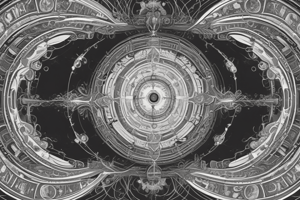Podcast
Questions and Answers
What is required for a theory to be considered falsified?
What is required for a theory to be considered falsified?
- Theoretical consensus from many scientists
- A significant majority of supporting evidence
- One observation that contradicts it (correct)
- Countless observations confirming it
What does 'ceteris paribus' imply in the context of scientific theories?
What does 'ceteris paribus' imply in the context of scientific theories?
- Theories can coexist regardless of contradictions
- The theory must be discarded upon any new evidence
- All aspects of a theory must remain constant
- Only current predictions are affected by changes (correct)
What is an example of a law that has been abandoned based on new evidence?
What is an example of a law that has been abandoned based on new evidence?
- Law of universal health
- Law of conservation of energy
- Law of gravity
- Law of conservation of matter (correct)
What typically happens when evidence contradicts a well-established theory?
What typically happens when evidence contradicts a well-established theory?
Why do scientific theories require a large amount of empirical observation?
Why do scientific theories require a large amount of empirical observation?
In scientific theories, statements are interdependent. What does this imply?
In scientific theories, statements are interdependent. What does this imply?
Which statement correctly reflects inductive reasoning in science?
Which statement correctly reflects inductive reasoning in science?
What can often prevent the immediate abandonment of a scientific theory?
What can often prevent the immediate abandonment of a scientific theory?
Which statement best describes the Ptolemaic theory compared to the Copernican theory?
Which statement best describes the Ptolemaic theory compared to the Copernican theory?
What was one significant challenge faced by Copernicus' theory during his time?
What was one significant challenge faced by Copernicus' theory during his time?
What does Ockham's razor suggest about the acceptance of scientific theories?
What does Ockham's razor suggest about the acceptance of scientific theories?
Which of the following best defines 'empirical possibility' as described in the context?
Which of the following best defines 'empirical possibility' as described in the context?
What distinguishes 'technical possibility' from 'empirical possibility'?
What distinguishes 'technical possibility' from 'empirical possibility'?
Which of the following scenarios is considered logically impossible?
Which of the following scenarios is considered logically impossible?
How did the understanding of what is considered 'empirically impossible' evolve over time?
How did the understanding of what is considered 'empirically impossible' evolve over time?
Which of these principles best describes the relationship between complexity and acceptance of theories?
Which of these principles best describes the relationship between complexity and acceptance of theories?
What is a key feature of the laws of nature?
What is a key feature of the laws of nature?
Which statement best describes the difference between laws and theories in science?
Which statement best describes the difference between laws and theories in science?
What is an essential characteristic of scientific theories?
What is an essential characteristic of scientific theories?
How does Einstein's theory relate to Newton's laws of nature?
How does Einstein's theory relate to Newton's laws of nature?
What is a primary focus when scientific explanations address the 'why' of occurrences?
What is a primary focus when scientific explanations address the 'why' of occurrences?
Which of the following is a misconception about scientific laws?
Which of the following is a misconception about scientific laws?
What does induction in the context of scientific theories refer to?
What does induction in the context of scientific theories refer to?
What is implied by the statement that science is a logical fallacy of 'affirming the consequent'?
What is implied by the statement that science is a logical fallacy of 'affirming the consequent'?
Flashcards
Falsifiability of theories
Falsifiability of theories
A theory can be proven wrong with a single counterexample, but numerous confirmations do not definitively prove it.
Inductive Confirmation
Inductive Confirmation
The process of gathering observations to support a theory. While many observations support a theory, it isn't conclusive; a single counter-example can invalidate it.
Ceteris Paribus
Ceteris Paribus
Assumption that all other variables remain constant when testing a theory; even an exception does not immediately invalidate the theory. It may need an alternative explanation based on other factors.
Refuting Scientific Theories
Refuting Scientific Theories
Signup and view all the flashcards
Conservation of matter
Conservation of matter
Signup and view all the flashcards
Conservation of Energy
Conservation of Energy
Signup and view all the flashcards
Interconnected Theories
Interconnected Theories
Signup and view all the flashcards
Empirical Observation
Empirical Observation
Signup and view all the flashcards
Ptolemaic theory
Ptolemaic theory
Signup and view all the flashcards
Copernican theory
Copernican theory
Signup and view all the flashcards
Occam's Razor
Occam's Razor
Signup and view all the flashcards
Empirical possibility
Empirical possibility
Signup and view all the flashcards
Technical possibility
Technical possibility
Signup and view all the flashcards
Logical possibility
Logical possibility
Signup and view all the flashcards
Parallax
Parallax
Signup and view all the flashcards
Speed of light
Speed of light
Signup and view all the flashcards
Laws of Nature: Fundamental
Laws of Nature: Fundamental
Signup and view all the flashcards
Newton's Laws: Universality
Newton's Laws: Universality
Signup and view all the flashcards
Law of Nature: Prediction
Law of Nature: Prediction
Signup and view all the flashcards
Laws of Nature: Imperfect?
Laws of Nature: Imperfect?
Signup and view all the flashcards
Explanation in Science: What?
Explanation in Science: What?
Signup and view all the flashcards
Theories: Explanation
Theories: Explanation
Signup and view all the flashcards
Theories: Proven?
Theories: Proven?
Signup and view all the flashcards
Theories: Falsifiability
Theories: Falsifiability
Signup and view all the flashcards
Study Notes
Philosophy of Science
- This course explores the nature of scientific knowledge.
Scientific Knowledge
- Focuses on the work of Hospers.
What is Science?
- Observing regularities in the world is fundamental to science; examples include the sun rising in the east, iron rusting, and chickens laying eggs.
- Irregularities, like some trees not bearing fruit, make comprehending the world challenging.
Introduction to the Philosophy of Science
- Regularities are needed to predict the future and guide action, however, they aren't always consistent.
- Experience doesn't guarantee future outcomes; predicting that keeping a sick friend away from someone will prevent that person from catching a cold, but that may not happen.
- Science seeks fundamental, unchanging patterns (invariants) in nature.
Laws of Nature
- Laws of nature are distinct from human-made laws, as they are descriptive rather than prescriptive.
- Laws of nature are discovered, not invented.
- Laws of nature are universal statements which are confirmed by observations.
Features of Laws of Nature
- First Feature: Universal statements in the format "All A's are B's". Examples include "All lead melts at 327.5°C" and "All iron rusts when exposed to oxygen."
- Second Feature: Open-ended; they apply over time and space. Laws may require adjustments over time, as they are adjusted based on observation. This example is found when a previous law isn't accurate on mountaintops where the pressure is different, which alters the boiling point of water.
- Third Feature: Expressible as hypothetical statements, like "If there were a crow, it would be black" (based on observation/experience). The ability to state a hypothetical scenario.
- Fourth Feature: Higher generality means a greater chance of being a law of nature. Low-level generalizations do not necessarily affect the universe, whereas fundamental laws do. The example of the melting point of lead or birds with three legs.
Laws of Nature: Overall
- Knowledge of laws enables prediction of future occurrences and events
- Laws frequently undergo revision or modification as further observations refine or expand our understanding. Examples include aspects of Newton's laws (gravity) being modified by Einstein's theory.
Explanation in the Context of Science
- Explanations in science often seek a "why" rather than just a "how".
- Laws of nature describe, while theories explain.
- Scientific theories may involve unobservable entities not detected through our senses.
Theories
- Theories are not definitively proven but rather inductively confirmed.
- Scientific theories involve a process of induction (drawing general conclusions from specific observations). Deduction doesn't always work.
- Theories are not rejected on one single observation, and it takes a lot of contradictory evidence to discredit a theory. They are generally supported by bundles of related claims.
Inductively Confirming Theories
- Theories are based on empirical observation and tested repeatedly. A single contradictory observation can falsify a theory.
- Theories are supported by bundles or groups of statements rather than just single claims.
- If a prediction is wrong, this doesn't require the dismissal of the theory, but rather that circumstances outside of the model must be taken into account. Also, theories can be adjusted to fit new information.
- This is due to the interconnectedness of statements within each theory, such that if one is doubted, other related statements in the system may also become questionable.
Changing Laws and Theories
- Laws and theories can be revised or even overturned over time as newer, more encompassing explanations arise.
- Examples include the shift from the law of conservation of matter to the law of conservation of energy.
- In a scientific discovery, multiple contradictory pieces of evidence are needed before a well-established theory is abandoned.
Theories in Astronomy
- Theories can be evaluated by considerations such as simplicity (fewer principles needed).
- Simpler theories that adequately explain observations are favored over more complex ones. Ockham's razor ("entities should not be multiplied without necessity").
- Ptolemy's theory had to posit more epicycles to account for astronomical observations. Copernicus' theory was much simpler, but was, for a time, deemed inaccurate due to a lack of observation, This demonstrates how scientific theories can have different levels of simplicity and explanatory power.
Possibility
- Empirical possibility: Things that were once deemed impossible (like heavier-than-air flight) have become possible as our knowledge progressed.
- Technical possibility: Even when something is theoretically possible according to the laws of nature, it might not be technically achievable given our current abilities and technological limitations.
- Logical possibility: Something is logically possible if it does not contradict the rules of logic. A logical impossibility would contradict these rules.
Studying That Suits You
Use AI to generate personalized quizzes and flashcards to suit your learning preferences.





